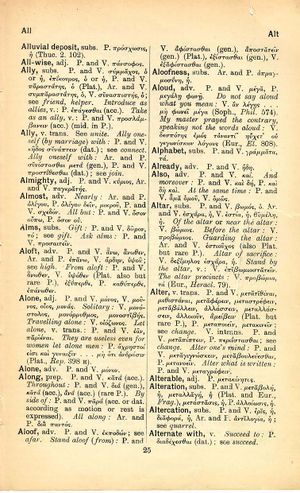also: Difference between revisions
From LSJ
Cras amet qui numquam amavit quique amavit cras amet → May he love tomorrow who has never loved before; And may he who has loved, love tomorrow as well.
(CSV3) |
(de4_1) |
||
| Line 7: | Line 7: | ||
<b class="b2">At the same time</b>: P. and V. ἅμα [[ὁμοῦ]], V. [[ὁμῶς]]. | <b class="b2">At the same time</b>: P. and V. ἅμα [[ὁμοῦ]], V. [[ὁμῶς]]. | ||
}} | |||
{{GermanLatin | |||
|dela=also, I) Folgerungspartikel, s. [[daher]] no. II. – Ist es = das heißt, id [[est]]; [[hoc]] [[est]]. – und [[also]], und [[also]] [[auch]], s. und. – II) Adv.[[ita]]. [[sie]] (so, w. s.). – [[hunc]] in (ad) modum ([[auf]] diese [[Weise]]). – [[adeo]] (in dem Grade). – [[sie]] redeten [[also]], ad [[hunc]] modum locuti sunt: es ist [[also]] [[geschehen]], [[factum]] [[est]] [[ita]]. – alsobald, s. [[sogleich]]. | |||
}} | }} | ||
Revision as of 09:45, 15 August 2017
English > Greek (Woodhouse)
adv.
P. and V. καί.
And moreover: P. and V. καὶ δή, P. καὶ δὴ καὶ.
At the same time: P. and V. ἅμα ὁμοῦ, V. ὁμῶς.
German > Latin
also, I) Folgerungspartikel, s. daher no. II. – Ist es = das heißt, id est; hoc est. – und also, und also auch, s. und. – II) Adv.ita. sie (so, w. s.). – hunc in (ad) modum (auf diese Weise). – adeo (in dem Grade). – sie redeten also, ad hunc modum locuti sunt: es ist also geschehen, factum est ita. – alsobald, s. sogleich.

